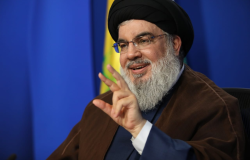Rising Muslim Concerns about Islamic Extremism
Concern about Islamic extremism is rising among many of the world’s Muslims, according to a new Pew Research Center survey. In five of the 11 surveyed countries — Indonesia, Jordan, Pakistan, Tunisia and Turkey — worries about extremism have increased since 2012.
Concern about Islamic extremism is rising among many of the world’s Muslims, according to a new Pew Research Center survey. In five of the 11 surveyed countries — Indonesia, Jordan, Pakistan, Tunisia and Turkey — worries about extremism have increased since 2012. A median of 67 percent of Muslims across the 11 countries are somewhat or very concerned about extremism. At least half of the Muslims surveyed in most countries surveyed said that suicide bombing or other acts of violence that target civilians can never be justified in the name of Islam. The following are excerpts with a link to the full text at the end.
Extremist groups, including al Qaeda, garner little popular support. Even before his death in 2011, confidence in al Qaeda leader Osama bin Laden had plummeted among many Muslims. Today, al Qaeda is widely reviled, with a median of 57% across the 11 Muslims publics surveyed saying they have an unfavorable opinion of the terrorist organization.
The Taliban are viewed negatively by a median of 51% of Muslims in the countries polled. Hezbollah and Hamas fare little better. Hezbollah, in particular, has seen its support slip in key Middle Eastern countries, including a 38-point drop in favorable views among Egyptian Muslims since 2007. Nigerian Muslims overwhelmingly oppose Boko Haram, the extremist movement at the center of a violent uprising in the northern part of the country.
In many of the countries surveyed, clear majorities of Muslims oppose violence in the name of Islam. About three-quarters or more in Pakistan (89%), Indonesia (81%), Nigeria (78%) and Tunisia (77%) say suicide bombings or other acts of violence that target civilians are never justified. And although substantial percentages in some countries think suicide bombing is often or sometimes justified, including a 62%-majority of Palestinian Muslims, overall support for violence in the name of Islam has declined among Muslim publics during the past decade.
Across most of the countries surveyed, gender, age, income and education are not closely associated with support for suicide bombing. However, there is a generational gap in Tunisia, with Muslims under 30 years of age more than twice as likely as those 50 and older to say that suicide bombing is at least sometimes justified (17% vs. 6%). In Lebanon, attitudes toward suicide bombing also vary with age, but in the opposite direction: Muslims 50 years or older (43%) are more likely than those 18-29 years of age (28%) to say such violence is justified.
Click here for the full report.
Related Program

The Islamists
Learn more about Hamas and how it relates to similarly aligned organizations throughout the region. Read more










